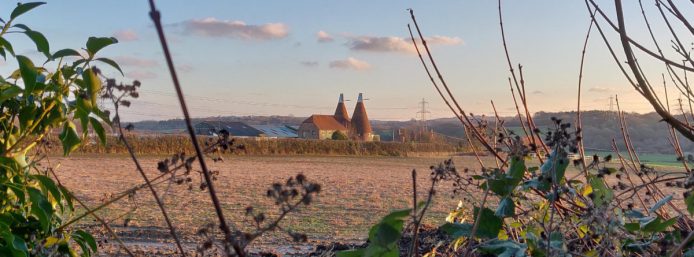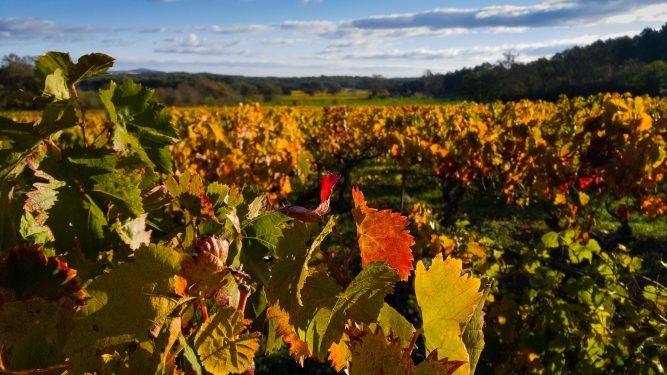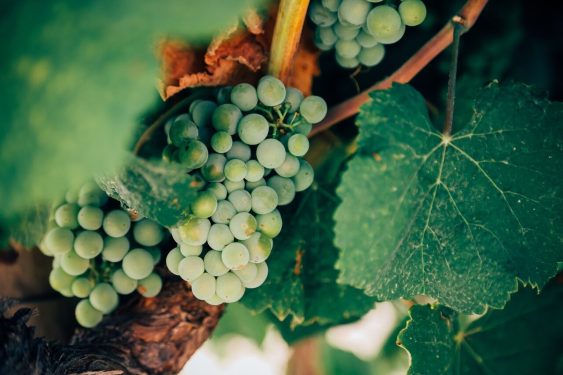Your Mini Basket

The most 'English' English Sparkling Wine...?
"I've spent a lot of my life teaching about sustainability and thinking about it a lot, trying to convince other people to do things. Then I realised the way I can change the world is firstly change it for myself, the bit I'm in control of, do what I believe in..."
‘Terroir’. A slightly contentious term, used a lot in the wine trade, that tries to encompass the impact of the natural world on a wine, be it climate, micro or otherwise, soil and subsoil geology, and maybe even the wildlife co-habiting the vineyard. Proponents believe it goes some way to explaining the beauty of some of the world’s very best wines; detractors might point to the undoubtable impact of the winemaker’s hands. Most of the winemakers in the UK would claim to be expressing terroir pretty well in their wines, especially those with the privilege of chalk sub-soils, the gold in the (south-facing, sheltered) hills of English sparkling wine-making.
Others might disagree.
“I would say we're one of the only people making terroir-based wine in the UK.”
We’re talking to Robin Snowdon, co-owner along with wife Georgina, of the biodynamic farmed Limeburn Hill Vineyard, just south of Bristol. We were fortunate enough to visit Robin on our first venture out of Cheltenham since lockdown restrictions were lifted. The depths of the first wave of the pandemic showed us and many other independent wine retailers just how much people like wine, so on a warm day in August, we were admittedly rather in the mood for getting out of the shop to spend the day walking around a field and tasting some wine. We didn’t expect to drive away having had such thought-provoking and challenging conversation with someone whose career so obviously transcends passion.
“I think the concept of terroir is much bigger than the soil and the aspect, I really do. In biodynamics, the land is a self-contained individuality. Every bit of that farm is part of that, when you move on to the next bit that somebody else is working with, even if it’s with the same principles and the same vines, they'll intensify the life in that soil; it'll never be exactly the same, there'll always be something slightly different in the soil, in the wind, in the amount of water that comes down and flows through, the more that you work with that, the more you intensify that, the more the terroir of that place becomes expressed.”
What is Biodynamic Agriculture?
Biodynamic agriculture, a concept formed by philosopher, ecologist and (claimed) clairvoyant, amongst other things, Rudolf Steiner.
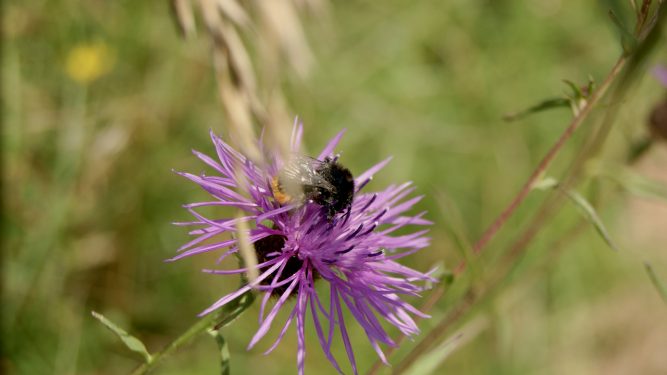
Biodynamics walks the line between spirituality and science, from treating the farm as a unified whole to carrying out certain tasks according to lunar and planetary phases, to applying specified preparations to the land. While the extent to which a farmer implements the spiritual side of Steiner’s theories varies considerably, the scientific side is well-rooted in organics.
“If you [use] herbicide, you destroy your terroir. It’s gone. Terroir is about all the life in a place, the more you can increase it, the more wildlife you have, [the more] bacteria, microbiology, fungal matter you've got in the soil, the more birds you have, the more insects that you have, the more bees that you have, the more wasps that you have, the more intense the [expression of] terroir.”
Prior to owning Limeburn Hill, Robin was a lecturer in sustainability, ironically enough, at one of the University of Gloucestershire’s Cheltenham campuses, and he hasn’t been in the wine world for long. That lack of exposure to the wine world has blessed Robin with an independence from some of the trade’s stuffier language (which we are all too guilty of falling into) and a focus on selling his wine as a product of sustainability as much as of vines. We asked Robin how he would explain his wines.
“I don't have a huge knowledge of wine. If someone comes in [to your shop] and says, 'have you got a biodynamic wine', you'd probably end up going we've got one from here, one from there. If you say how would you describe the wine, I'd probably start by describing the vineyard. What we do and why we do it. Then you get the wine out of that.”
Sat on straw bales at the bottom of Limeburn Hill’s sloping vineyard, tasting the Beltain Amber Pet Nat, our discussion turned to the fact that a lot of the wine sold in independent merchants is farmed fairly conventionally, with herbicides and pesticides used where considered necessary.
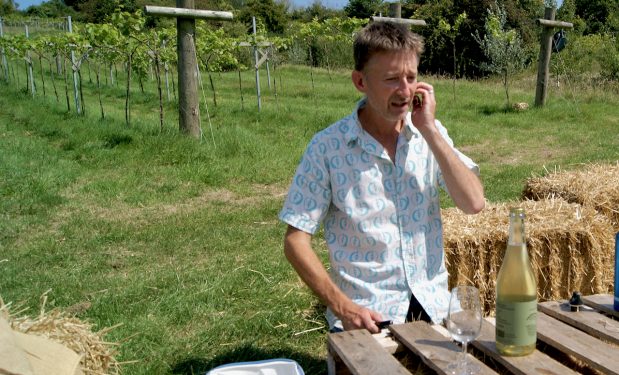 “There's no easy answer to that, I realise that. I have to remember, we're in the situation that we're in now. I would love the world to change, just like that, but it won't, it has to go through a very long, slow change. Little bit by little bit.”
“There's no easy answer to that, I realise that. I have to remember, we're in the situation that we're in now. I would love the world to change, just like that, but it won't, it has to go through a very long, slow change. Little bit by little bit.”
Natural, Organic & Biodynamic. Blurred Lines.
For Robin, expression of terroir comes through minimal intervention, ‘natural’ winemaking, and the practice of Biodynamic farming.
“We're trying to look after the land, to care for the land in a way that makes it more healthy and resilient, more full of life. Air, water, soil, plants. As a by-product of that, natural wine comes out.”
Natural wine is another difficult, contentious talking point. At its most simple, it is winemaking with minimal intervention; fewer preservatives added, such as sulphur, certainly, organic farming, preferably, but often also more than that. A dedication to making wine that expresses place over person. The term is not without its faults, for what exactly is ‘natural’?
“The natural course would be [for the grapes] to drop on the ground and before they reached any particular alcohol level, they'd begin to rot. Obviously, we're not trying to do that; there has to be intervention. Our focus has been on understanding what is the purest wine that can come out of those grapes. Trying to get away from any additional flavours, from oak, excessive oxidation, excessive bacterial growth. Working with the yeast and the grapes in as clean a way as possible in order to create the cleanest wine that will come out of those grapes.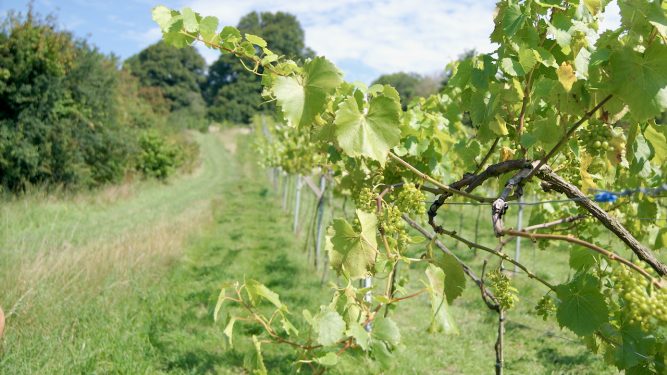
“There are little things like that that I think we could experiment with. But there's kind of two key principles to our winemaking. It’s the vineyard that makes the wine, not the winemaker, and also that the year makes the wine. We accept what the year gives us. The more manipulation you do, the further away you get. This issue of terroir is to do with the place but also the time. A place and a time have a specific terroir.”
In this sense, natural winemaking is often about the balance between protective decisions - from the decision to even harvest grapes and put them in some sort of vessel, to the choice to keep that vessel immaculately clean - and creative decisions.
“There are certain decisions we make of course, [like] which grapes to put with which. At the moment we harvest half of the Orion and all of the Pinot [Noir] and that goes into the rosé. We could do a third of the Orion and all of the pinot and that would make a slightly different wine. There's those decisions. This year we're hoping to make a still amber wine, we'll probably use the Orion and the Seyval [Blanc] for that, which means there may be less of the Orion in the rosé and in the Pet Nat Amber.”
But for the most part, those creative decisions are mostly made on Robin’s behalf by the nature around his vines.
“You're making that initial decision, setting it off in a certain direction, then allowing it to get there on its own. Then protecting it. Sort of like a child... the whole Steiner education thing about allowing the child to be what the child is, not trying to force the child to be something different. It just occurred to me yesterday. We're trying to allow it to become what it wants to be, rather than what we want it to be.”
Rudolf Steiner - The Good
Steiner was a prolific thinker and the founding father of biodynamic agriculture. In physical terms, biodynamic agriculture is effectively an augmented organic agriculture. Synthetic chemical treatments are eschewed in favour of a variety of compost and herbal preparations, some of which are frequently ridiculed for their claims of benefit. The classic example is BD500, a cow horn filled with manure which is buried in the ground over-winter then dug out and its contents diluted and sprayed around the farm. But this is barely even half of the theory that makes up the practice.
“There’s this idea about the farm as an organism. Being in the farm and having a sense of what it needs as a being. Organic agriculture in general is far more scientific, it says this is bad for the soil so you can't use it, that's bad for the plant, this is a poison and you shouldn't use this. It does a lot to cut out a lot of the bad things. But it doesn't necessarily say ‘how can you perceive your land?’ ‘How can you have a relationship with your land?’
"In addition to that, you get all the preparations. There's the application, the preparation of them, you know when to harvest the yarrow, the dandelions. You know what you do with them. It puts you in touch with the rhythms of the land, the rhythms of the year. Organic practice doesn't require you to do that. I'm sure many organic farmers are completely in touch with those things but it isn't part of organic agriculture.”
Rudolf Steiner - The Bad & The Ugly?
This point of difference is absolutely at the spiritual, non-scientific end of the spectrum. For a great many, that’s a step too far. Joshua Dunning recently wrote a thorough piece on his blog Word On The Grapevine about his issues with Steiner and biodynamic agriculture, writing that:
“Pseudoscience is not a victimless crime, the spread of pseudoscience can and does kill. This is precisely why those who are scientifically literate ought to be doing as much practicable to increase understanding of the scientific method, to encourage others to confidently apply scepticism in the face of extraordinary claims.
“One may think that the advocation of biodynamics, harmless though it may seem, is justifiable for some greater good (such as eradicating pesticides); however, the advocation of pseudoscience erodes public understanding and appreciation for good science, discredits the work of serious scientists and makes it harder to encourage critical thinking.”
There is also the rather uncomfortable truth that Steiner, perhaps to an extent, of his time, might have held some distinctly unsavoury views. As Zoe Williams wrote in The Guardian in her piece on Steiner schools in 2019, “the headline contention was the very pronounced racism of Rudolf Steiner, who thought black people lived an “instinctual life”, and white people an “intellectual life.” While some of these claims around modern-day Steiner teaching have been disputed, and though we ought not to completely dismiss a person’s work because of the other things they have gotten wrong, they are nonetheless problematic.
We’re on the same side of the sceptic fight against pseudoscience (and racism, need it be said) as Joshua, but it seems to us that biodynamic agriculture with its fundamental ethos of treating the vineyard as an interlinked ecosystem is allowing room for the development of new viticultural practices that are making improving soil health and wine quality in a number of wine regions. It might be that ‘biodynamics’ is evolving into something beyond that label, which for some will require a new name, while for others still allows for some expression of spirituality in their farming.
The New Biodynamics
In her piece for www.jancisrobinson.com, Katia Nussbaum of San Polino in Montalcino discusses how her approach to biodynamic viticulture has changed, informed by results in her own vineyard and aiming to “awaken us to a modernised and pertinent vision of biodynamics, as seen from the viewpoint of a twenty-first-century organic winemaker.”
“We could see the ‘essential truths’ of categories used by Steiner as constructions, some of which may have outgrown their use or be meaningless, or even, at the very worst, reactionary.
“Steiner had the extraordinary intuition of the farm as a living organism. Through a modern-day lens we can view this as a part of the homeostasis of the ecological systems of the planet earth; Earth as Gaia. Steiner had ideas that pre-dated the organic movement, but elucidated them using the analytical tools and culture of his times and environment. He wrote in the absence of highly powered microscopes and understanding of quantum physics and string theory.”
In response, Nigel Greening of the acclaimed, and biodynamically farmed, Felton Road in Central Otago, New Zealand, wrote that “more and more farmers are convinced evangelists for the 'dynamic ecosystem' approach: the idea that we can understand and form sympathetic alliances with the underlying ecosystems of our land and this lies at the heart of successful biodynamic farming.”
“The question, I suppose, is this: yes, this is a brilliant way to farm, yes, it produces good results. But is it biodynamics?
“I think it is, despite the lack of reliance on cosmic energies, potions and astrological calendars. I was wondering what Steiner might think but, really, that doesn’t matter. He’s been dead a long time and ideas are not responsible for, or to, the people who thought them up.”
Nigel goes on to bridge the two sides of the argument:
“Ideas that are not challenged become dogma. It may enrage some, or many, but everything should be open to reasoned enquiry. The idea that some principles are sacred is deeply unhealthy. Science is about curiosity, about not knowing, but wanting to know. It always worries me the number of biodynamic farmers who seem to be almost gleefully anti-science. Being anti-science is about being anti-knowledge. We have to embrace enquiry, new knowledge, and change to be better farmers. And that means being wary of dogma.”
Spirituality & The Art of Winemaking
Winemaking, in its unique combination of art and science, is so often a chance for a person to express something about themselves, as it does for Robin.
“I've always had a spiritual connection with nature. I was brought up as a Christian and it never agreed with me. I was always out in nature. As I began to find out there are ways, Shintoism, Taoism, maybe that [there] is a spiritual path that is about the way that I connect with nature. That's definitely part of the reason I connected with biodynamics. The nice thing about biodynamics is that people talk about using your feelings and your intuition. It accepts that that is a legitimate thing to do.”
In Nigel Greening, Katia Nussbaum and Robin’s eyes, there is clearly something that sustainable, organic agriculture, permaculture even, does not allow for but that biodynamic agriculture does. Robin continues:
“The key thing about biodynamics is its connection with place. That's absolutely fundamental, the potential of a place, the terroir, is the same as the potential of a being. It links completely with what Steiner taught about the farm as a living organism.”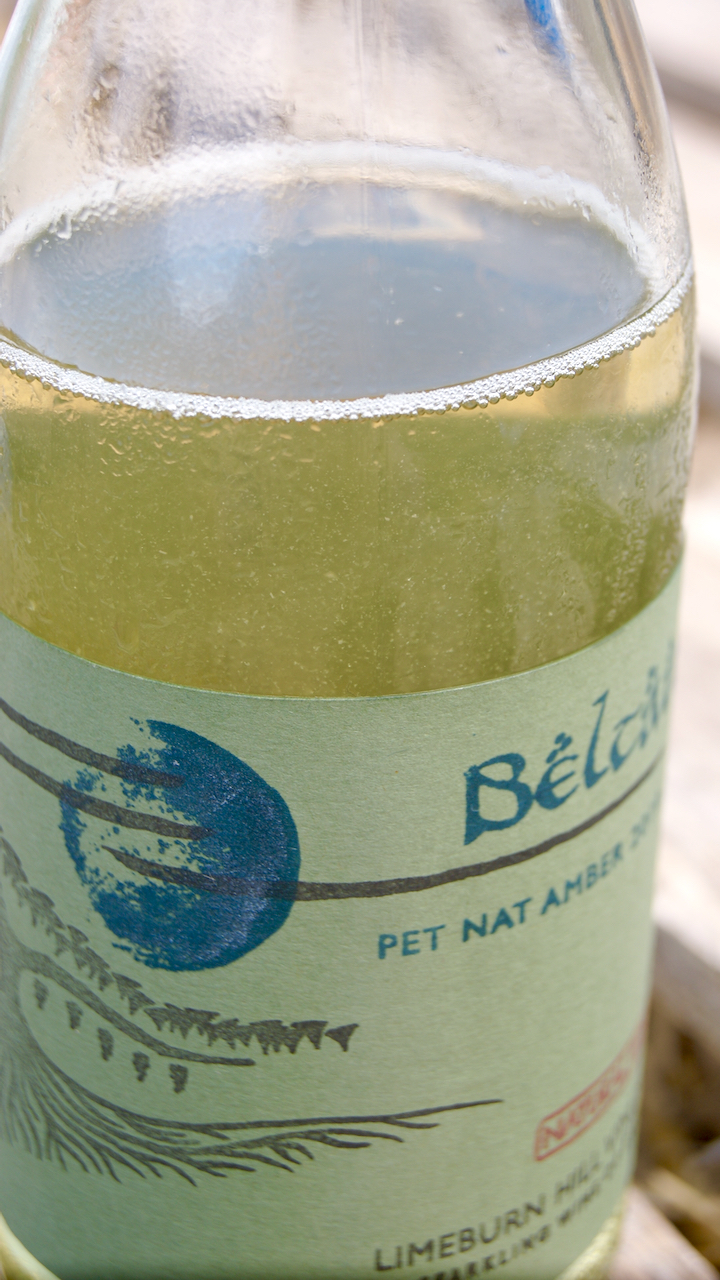
As Joshua Dunning writes, a common defence of biodynamics is “that because DRC (Domaine de la Romanée Conti, makers of some of the world’s finest and most expensive wines) and a number of other top producers practice biodynamics this is somehow a validation of the method’s efficacy.” On this, though for different reasons, he and Robin might agree.
“I'm not saying that everybody who works biodynamically expresses terroir. I think if you really do follow and think it through and you push the individuality of the land, and of the farm, then I think that's where you end up.”
And then there’s the fact that winemakers may not want to use the grape varieties or methods forced upon them by the traditions of their region. Robin continues:
“You’ve got this massive cultural requirement of the PDO, PGI (EU designations of geographically and culturally unique agricultural products) and the culture of that place and country, the wine culture across the world."
“It’s interesting that a lot of younger winemakers seem to be playing with that, just going for VDF (Vin de France, the lowly table wine designation) but allowing themselves to do something more exciting, perhaps much more terroir based.”
The terroir, the whole terroir & nothing but the terroir
What if, on the other hand, a winemaker pursues terroir at the expense of all other winemaking sensibility, we ask Robin?
“You can make a very purely terroir-based wine, which is also terrible. And you can make a wine that tastes fantastic but has been made with chemicals. I'm trying to do both but they don't necessarily go hand in hand. You can follow your principles, there are lots of natural wines that follow their principles so purely, do as little as possible, and end up with something that most people would not enjoy. But it is a very pure expression of the grape.”
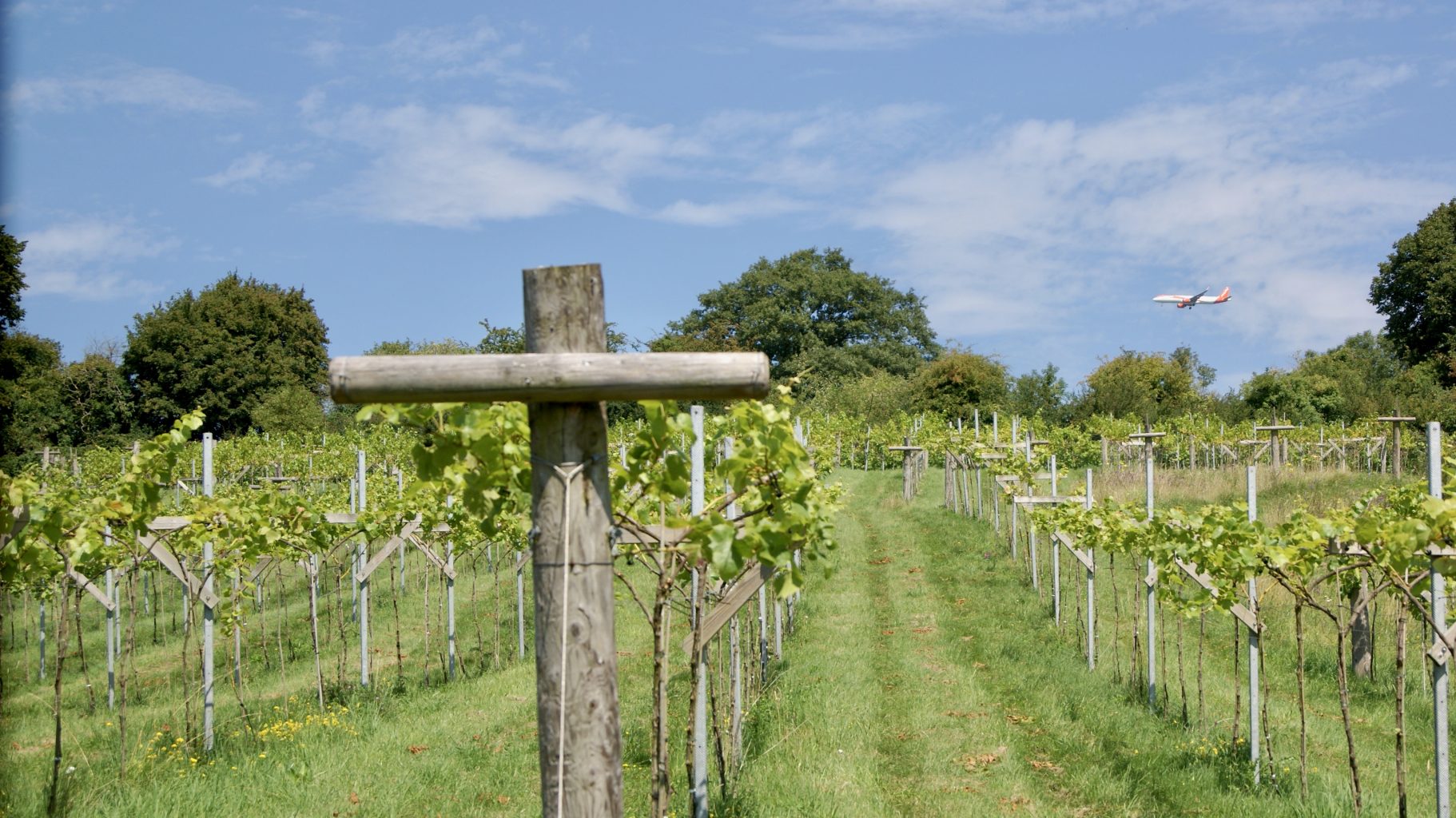
Given the way that the terroir of the famous limestone outcrop of the Côte d’Or in Burgundy or the deep alluvial gravels of the left bank Bordeaux are both heralded, it seemed pertinent to ask Robin what was so special about the terroir of these hills just south of Bristol, beneath the nearby airport’s flight path.
“I don't know. The reason I don't know is that it’s the first vineyard I've ever planted, the first wine I've ever made and there isn't any research which says if you grow Orion and Pinot Noir on a clay loam soil at this latitude, this is what you end up with. I'd probably say that it doesn't matter. If we had a slope on the other side of the Mendips, more of a limestone soil, and we'd done exactly the same processes, somehow maximise and intensify the quality of what's there, the individuality of that place, then we would end up with an equally good wine, but it would be a completely different wine. In that sense, the idea that it’s the land that creates a particularly good wine and other land won't do, I don't really buy into that. When you look at the different soils that people make good wine from, they're all sorts of soils.”
White Lines
Soil is a regular talking point in relation to English wine. The southern counties lucky enough to benefit from the chalk sub-soils of the North and South Downs are proud of the rock they stand on, pointing to its presence in the top vineyards of Champagne, 300 miles south. Chalk’s water retention makes it exceptional for drainage in a vineyard, meaning the vines have to work even harder to find moisture and nutrients. That stress seems to lead to better, and consequently more expensive, wines. But chalk is not the only means of draining a vineyard, nor can it express all there is to say about terroir, or a wine’s value. We asked Robin about the price of his wines.
“I think our wine is affordable to everyone. I don't think it’s a premium category, not when you look at what some people are charging. As a sparkling wine I think it is affordable. It’s not £7 for a cheap bottle of Prosecco. I don't think that just because that's cheap, that makes it affordable. It would be better if people bought a bottle of ours instead of 4 of those. I think it would be better for the planet as well.”
Are people ready to spend a little (or a lot) more on sustainable produce? Robin is cautious but committed.
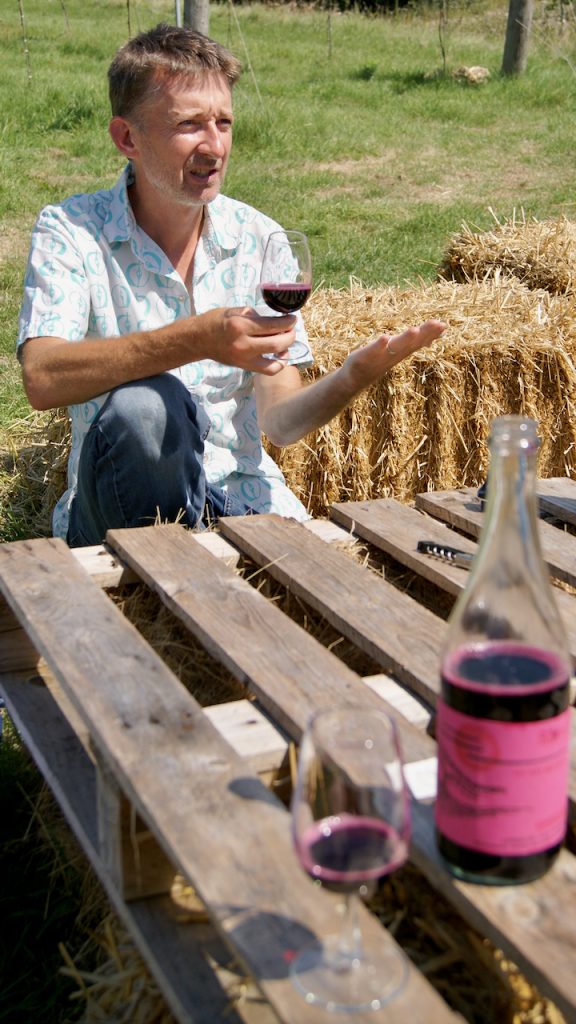
“I would hope so... I've spent a lot of my life teaching about sustainability and thinking about it a lot, trying to convince other people to do things. Then I realised the way I can change the world is firstly change it for myself, the bit I'm in control of, do what I believe in, and people can learn from that. I've always admired and learnt from people that are doing something, as opposed to talking about doing something. It’s much more interesting for me to learn from those sorts of people. I'd rather be someone that if people want to learn from, they can, if they don't, then they don't have to. Otherwise I start trying to tell people to do everything in the way I believe, it doesn't get anywhere.
“There's a basic fundamental problem with our food and drink system, in that its mass production, the lack of care for the soil and the environment which has led to an incredibly cheap source of food for us.”
With Steiner’s belief in the evolution of human-kind and the need to improve soil health for the future in mind, is Robin looking to hand down Limeburn Hill Vineyard?
“It's not so much that we're interested in passing it on. We're more like stewards [of the land], at this moment. Someone else will take it on at some point, at that time, the soil and the wildlife and the plants will be healthier than they were when we took it on. It will then be very clear that that is the best way of making the best wine. Ultimately we want to make the world better through a vineyard. Not save it, but make it better."





